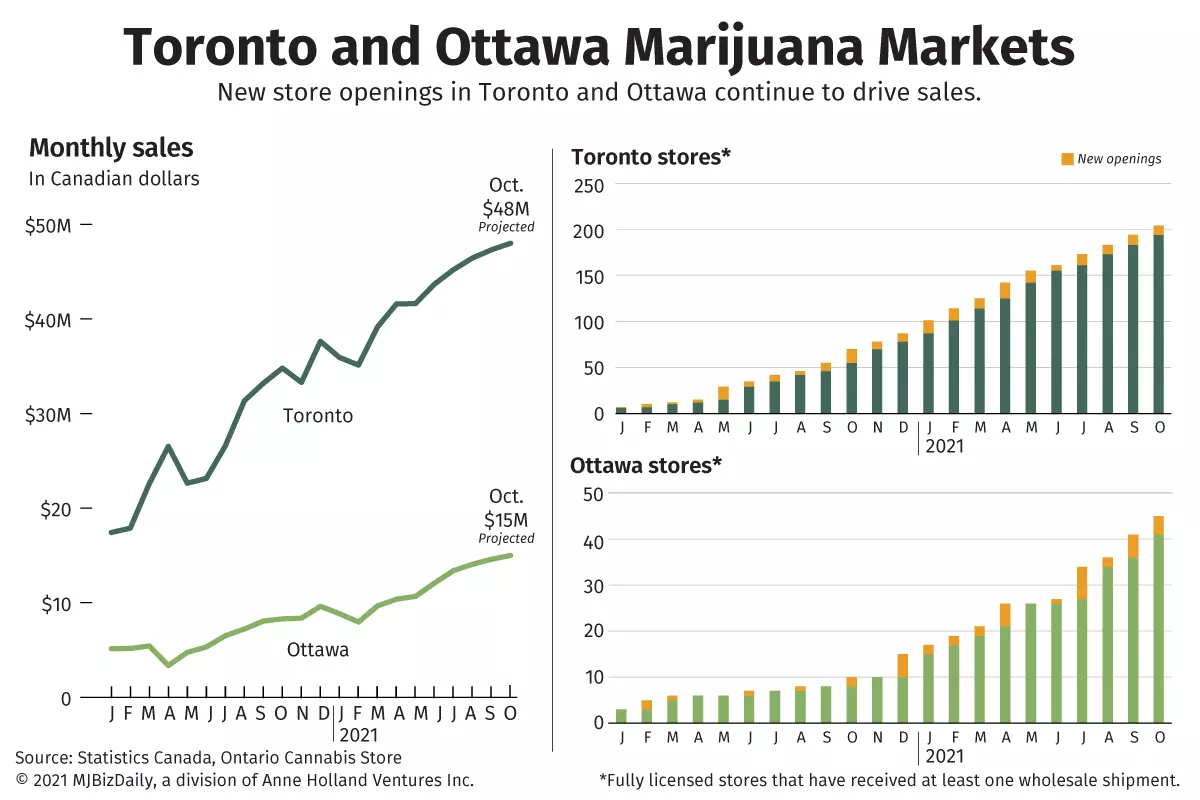Ontario’s cannabis wholesaler has room for improvement when it comes to managing its product inventory and forecasting demand for that merchandise from retailers, according to a new report from the Office of the Auditor General of Ontario.
After comparing six weekly inventory forecasts against actual inventory demand in the first half of 2021, the auditor general found that the “OCRC’s inventory forecast differed significantly from its actual inventory demand,” according to the Value-for-Money Audit released Wednesday.
In some cases, retailer demand exceeded forecasts, resulting in out-of-stock inventory; in others, demand fell short of projections, leading to unsold products being returned to producers.
OCRC stands for Ontario Cannabis Retail Corp., the formal name for the Ontario Cannabis Store, which is the government-owned monopoly wholesale cannabis supplier in Canada’s largest provincial recreational marijuana market.
When forecasted inventory falls short of actual demand, Ontario’s regulated cannabis sector “is consequently unable to satisfy customer demand … (resulting) in a loss of sales with end user customers turning to the illegal market to purchase similar products,” the report noted.
The auditor surveyed private retail stores in July 2021, finding that 47% were “not satisfied” with wholesale product availability and a further 19% were “very dissatisfied.”
“Specifically, 53 out of 67 comments from retailers related to concerns about the consistency of product availability and the high frequency of out-of-stock inventory,” according to the report.
The OCS told the government auditor that its demand forecasts were “impacted by significant week-to-week demand changes due to in-store shopping restrictions as a result of the pandemic and the provincial lockdown,” the report pointed out.
“However, we found that no formal analysis was done to confirm this assumption and to quantify the impact of the difference between forecast and actual results.”
In part, the auditor wrote, the problem could stem from the fact that the OCS “does not receive timely point-of-sale data from retail (cannabis) stores” and receives only monthly retail sales reports from the Alcohol and Gaming Commission of Ontario retail regulator.
When OCS inventory demand estimates were too high, the auditor reported, the result was overstocked inventory for which “the negative impact (was) mostly borne by licensed (cannabis) producers, who are required by contract to accept returns of unsold inventory at their full cost.”
More than two-thirds of products returned by the OCS to producers between April 2020 and March 2021 “were returned because the product was not selling,” according to the report.
Stay informed with MJBiz Newsletters
MJBiz’s family of newsletters gives cannabis professionals an edge in this rapidly changing industry.
Featured newsletters:
- MJBizDaily: Business news for cannabis leaders in your inbox each morning
- MJBiz Cultivator: Insights for wholesale cannabis growers & vertically integrated businesses
- MJBizCon Buzz: Behind-the-scenes buzz on everything MJBizCon
- MJBiz Retail + Brand: New products, trends and news for cannabis retailers, distributors and marketers
- Hemp Industry Week: Roundup of news from hemp farming to CBD product manufacturing
- And more!
The auditor recommended that the OCS address its inventory forecasting issues by getting weekly or biweekly retail store sales data and analyzing the differences between forecasts and actual demand, among other suggestions.
In a response published in the auditor’s report, the OCS said it accepted the recommendations and “agrees that improvements and transparency in its inventory management system and inventory forecasting model will result in efficiencies for OCRC and the industry.”
The wholesaler said it is working to access more timely retail point-of-sale data to improve its forecasts and inventory management.
The 66-page auditor’s report recommended that the OCS improve its operations in other areas, including:
- Response times to customer inquiries and complaints.
- Oversight of third-party warehousing and distribution supplier Domain Logistics.
- The product listing call and selection process.
- Progress toward its social responsibility objectives.
- Safeguarding of customer information.
“OCRC is taking steps to address operational gaps in these areas,” the report noted.
“As with any new company within a new emerging industry, the OCRC acknowledges that it has room for improvement,” the Ontario Cannabis Store wrote in response.
The Ontario auditor general’s report on the cannabis wholesaler was part of a larger annual report on provincial government programs and issues.
Solomon Israel can be reached at solomon.israel@mjbizdaily.com.





